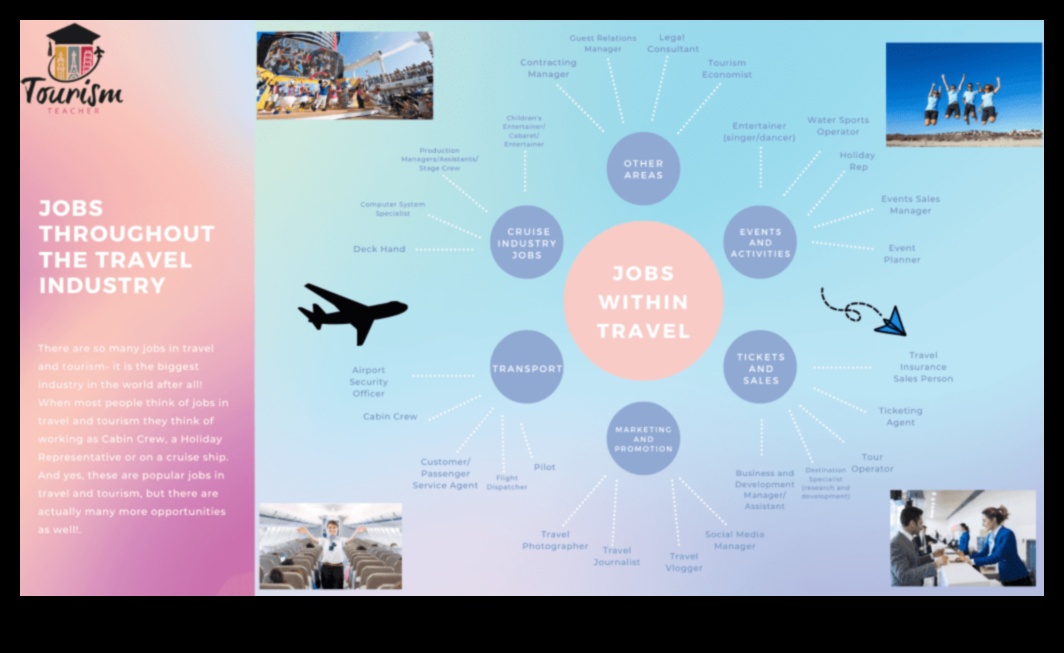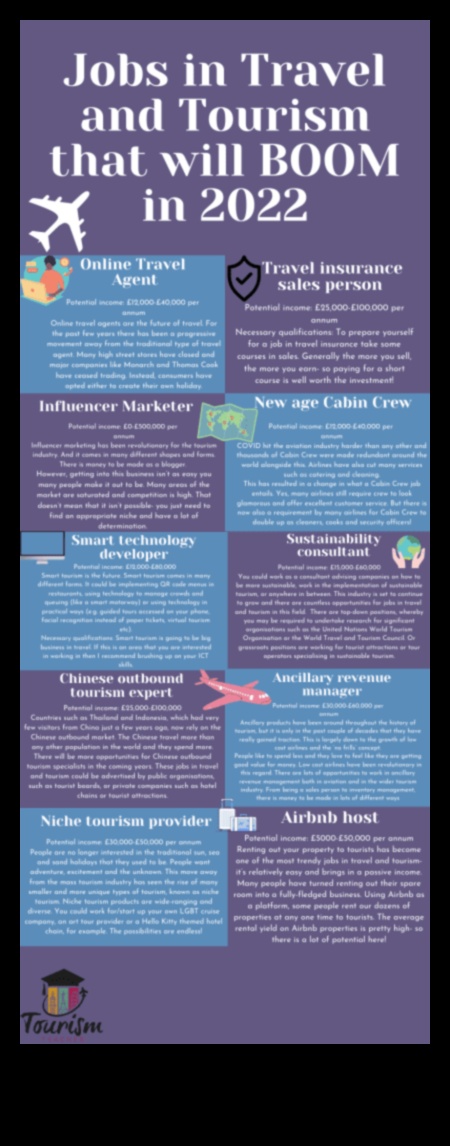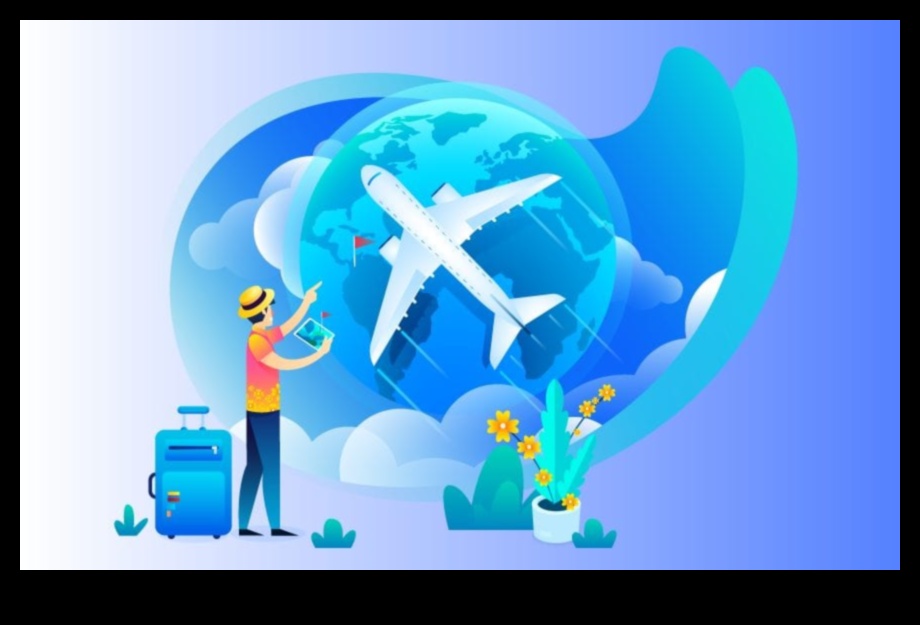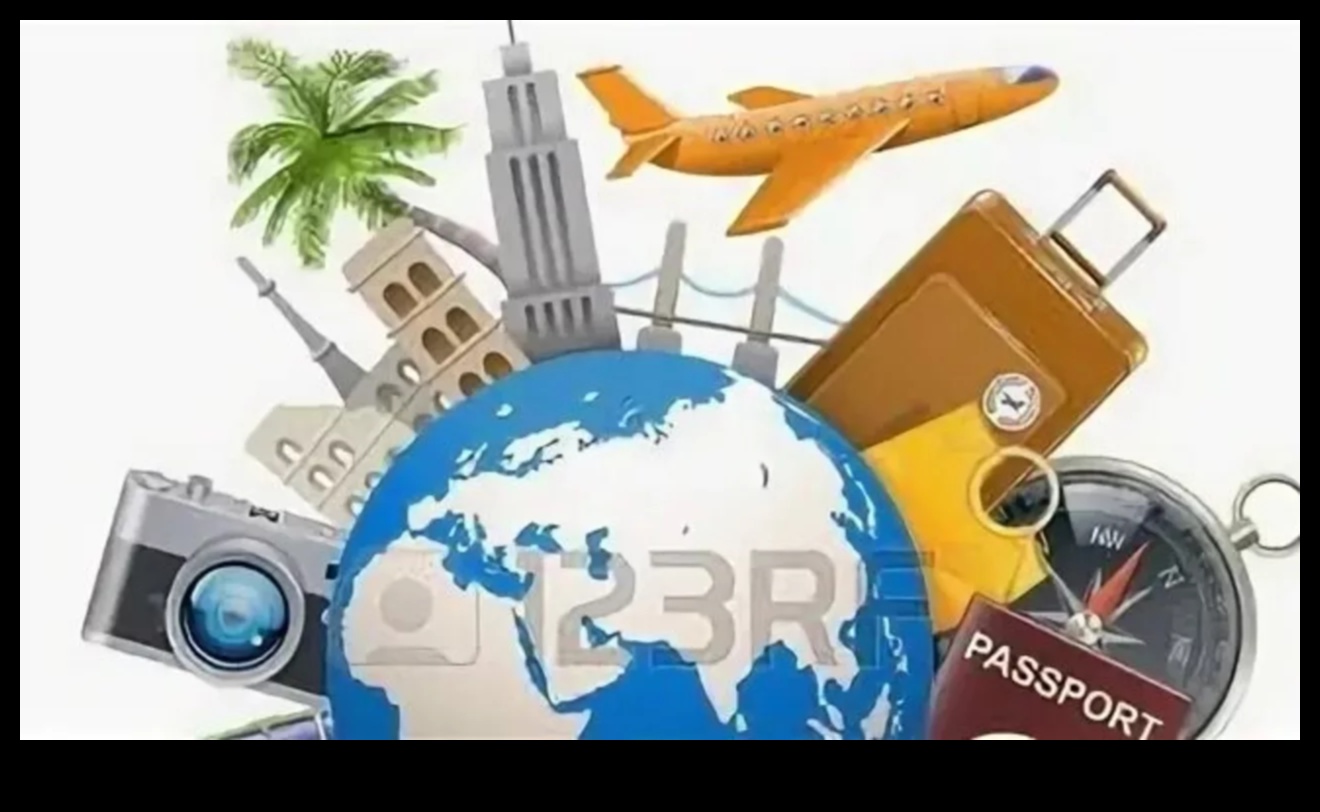
How to Get a Job in the Travel Industry
The travel industry is a large and diverse sector, with a wide range of job opportunities available. Whether you’re looking for a job in customer service, sales, marketing, or operations, there’s likely a role in the travel industry that’s right for you.
In this article, we’ll discuss the different types of jobs available in the travel industry, the skills you need to get a job in the industry, and the steps involved in applying for a job. We’ll also provide tips on how to stand out from the competition and land the job you want.

Types of Travel Industry Jobs
There are many different types of jobs available in the travel industry, from customer service representatives to tour guides to flight attendants. Some of the most common job titles in the travel industry include:
- Customer service representative
- Travel agent
- Tour guide
- Flight attendant
- Hotel manager
- Restaurant manager
- Resort manager
- Destination marketing manager
Skills Needed for Travel Industry Jobs
The skills you need to get a job in the travel industry will vary depending on the specific job you’re applying for. However, there are some general skills that are essential for most travel industry jobs, including:
- Communication skills
- Customer service skills
- Organizational skills
- Problem-solving skills
- Flexibility
- Adaptability
- Travel experience

Education and Training for Travel Industry Jobs
The education and training you need to get a job in the travel industry will vary depending on the specific job you’re applying for. However, many travel industry jobs require at least a high school diploma or equivalent. Some jobs, such as tour guides and flight attendants, may require additional training or certification.

Salary and Benefits for Travel Industry Jobs
The salary and benefits for travel industry jobs vary depending on the specific job, the company you work for, and your experience level. However, in general, travel industry jobs offer competitive salaries and benefits, including health insurance, paid time off, and retirement plans.
Job Outlook for Travel Industry Jobs
The job outlook for travel industry jobs is expected to be strong in the coming years. The Bureau of Labor Statistics projects that employment in the travel industry will grow by 10% from 2020 to 2030, faster than the average for all occupations. This growth is expected to be driven by the increasing demand for travel, as well as the growth of new travel technologies.
How to Find Travel Industry Jobs
There are many ways to find travel industry jobs. Some of the best ways to find jobs include:
- Search online job boards
- Network with friends and family in the travel industry
- Attend industry events
- Contact travel companies directly
Tips for Landing a Travel Industry Job
There are a few things you can do to increase your chances of landing a travel industry job, including:
- Get experience in the travel industry
- Build your network of contacts
- Develop your skills and knowledge
- Stay up-to-date on industry trends
- Be persistent and positive
Obstacles to Working in the Travel Industry
There are a few challenges that you may face
| LSI Keywords | Answer |
|---|---|
| travel industry jobs | There are many different types of jobs available in the travel industry, including jobs in airlines, cruise lines, hotels, tourism, and travel agencies. |
| travel jobs | The most common jobs in the travel industry include flight attendants, pilots, tour guides, hotel managers, and travel agents. |
| how to get a job in travel | To get a job in the travel industry, you typically need a degree in travel and tourism, business, or a related field. You may also need experience working in the travel industry. |
| career in travel | A career in the travel industry can be rewarding and exciting. It offers the opportunity to meet new people, see new places, and learn about different cultures. |
| travel careers | There are many different career paths you can pursue in the travel industry, including working as a flight attendant, pilot, tour guide, hotel manager, or travel agent. |
II. Types of Travel Industry Jobs
The travel industry is a vast and diverse one, with a wide range of job opportunities available. Some of the most common types of travel industry jobs include:
- Airline pilot
- Airline flight attendant
- Hotel manager
- Tour guide
- Travel agent
- Event planner
- Hotel concierge
- Travel writer
- Travel photographer
III. Skills Needed for Travel Industry Jobs
The skills needed for travel industry jobs vary depending on the specific role, but some of the most common skills include:
- Communication skills
- Customer service skills
- Organizational skills
- Problem-solving skills
- Adaptability
- Interpersonal skills
- Language skills
- Travel experience
In addition to these skills, travel industry professionals should also have a strong understanding of the travel industry and the different types of jobs available. They should also be familiar with the latest trends in travel and be able to adapt to changing market conditions.
IV. Education and Training for Travel Industry Jobs
The education and training required for travel industry jobs varies depending on the specific role. However, some of the most common educational requirements include a bachelor’s degree in business, marketing, or tourism. Additionally, many employers prefer candidates who have experience working in the travel industry or who have completed a relevant internship.
For some entry-level positions, such as travel agents or customer service representatives, a high school diploma or equivalent may be sufficient. However, candidates with a college degree will have a better chance of landing a job with a higher salary and more opportunities for advancement.
In addition to formal education, many employers also look for candidates who have strong communication, interpersonal, and problem-solving skills. Candidates who are able to speak multiple languages are also at an advantage in the travel industry.
The following are some of the most common educational programs for travel industry jobs:
- Bachelor’s degree in business, marketing, or tourism
- Associate’s degree in travel and tourism
- Certificate program in travel and tourism
- Internship in the travel industry
By completing the necessary education and training, you can increase your chances of landing a job in the travel industry.
V. Salary and Benefits for Travel Industry Jobs
The salary and benefits for travel industry jobs vary depending on the specific job, the employer, and the level of experience. However, some general trends can be observed.
On average, travel industry jobs pay more than other industries. According to the Bureau of Labor Statistics, the median annual wage for all travel-related occupations was $57,410 in 2019. This is higher than the median annual wage for all occupations, which was $51,960 in 2019.
Some of the highest-paying travel industry jobs include airline pilots, flight attendants, and travel agents. Airline pilots earn a median annual wage of $121,540, while flight attendants earn a median annual wage of $65,880. Travel agents earn a median annual wage of $46,670.
The lowest-paying travel industry jobs include tour guides and travel writers. Tour guides earn a median annual wage of $24,820, while travel writers earn a median annual wage of $55,430.
In addition to salary, travel industry jobs often offer a variety of benefits, such as health insurance, paid vacation, and retirement plans. Some employers may also offer tuition reimbursement or other perks, such as free or discounted travel.
VI. Job Outlook for Travel Industry Jobs
The travel industry is expected to grow by 4% over the next decade, creating an estimated 1.3 million new jobs. The demand for travel is expected to increase as more people travel for business and leisure. The growth of the travel industry will be driven by a number of factors, including:
- Increased disposable income
- Increased urbanization
- Increased demand for international travel
- Increased demand for sustainable travel
The travel industry is a diverse industry, and there are a number of different job opportunities available. Some of the most popular travel industry jobs include:
- Flight attendants
- Tour guides
- Hotel managers
- Travel agents
- Customer service representatives
The travel industry is a challenging but rewarding industry to work in. It offers the opportunity to meet new people, see new places, and learn about different cultures. If you are interested in a career in the travel industry, there are a number of steps you can take to prepare yourself:
- Get a degree in travel or tourism
- Gain experience working in the travel industry
- Network with people in the travel industry
- Develop your language skills
The travel industry is a great option for people who are passionate about travel and want to make a difference in the world. By working in the travel industry, you can help to make travel more accessible and affordable for everyone.
VII. How to Find Travel Industry Jobs
There are a few different ways to find travel industry jobs. Here are some of the most common methods:
- Search online job boards. There are many online job boards that list travel industry jobs. Some popular job boards include Indeed, Monster, and CareerBuilder.
- Network with people in the travel industry. Attend industry events, join professional organizations, and connect with people on LinkedIn.
- Contact travel companies directly. Visit the websites of travel companies that you are interested in working for and look for job postings. You can also send your resume and cover letter to the company’s human resources department.
- Use a travel job search engine. A travel job search engine is a website that aggregates job postings from multiple sources. This can be a helpful way to find travel industry jobs that are not listed on other job boards.
Once you have found a few jobs that you are interested in, it is important to tailor your resume and cover letter to each specific position. You should also make sure to highlight your skills and experience that are relevant to the job you are applying for.
When you are applying for a travel industry job, it is also important to be prepared for the interview process. Be sure to research the company and the position you are applying for. You should also practice answering common interview questions.
If you are successful in getting an interview, be sure to dress professionally and arrive on time. Be prepared to answer questions about your skills, experience, and why you are interested in the job.
Getting a job in the travel industry can be challenging, but it is definitely possible. By following these tips, you can increase your chances of landing the job you want.
Tips for Landing a Travel Industry Job
Here are some tips for landing a travel industry job:
- Network with people in the industry. Attend industry events, join professional organizations, and connect with people on social media.
- Get experience in the travel industry. Volunteer for a travel-related organization, work part-time in a travel-related job, or intern for a travel company.
- Develop your skills. Take courses in travel, marketing, sales, and customer service. Get certified in a travel-related field.
- Build your portfolio. Create a website or blog that showcases your travel experiences and skills. Write articles about travel, or create videos and photos that you can share online.
- Tailor your resume and cover letter to each job you apply for. Highlight your skills and experience that are relevant to the job you’re applying for.
- Practice your interview skills. Ask a friend or family member to conduct a mock interview with you. Prepare answers to common interview questions.
- Be persistent. Don’t give up if you don’t get the first job you apply for. Keep networking, building your skills, and applying for jobs until you find the right one.
IX. Obstacles to Working in the Travel Industry
There are a number of obstacles to working in the travel industry. These include:
- Competition. The travel industry is a competitive field, and there are many qualified people vying for the same jobs.
- Unstable hours. Travel jobs often require long hours and irregular schedules, which can make it difficult to maintain a work-life balance.
- Travel-related stress. Travel jobs can be stressful, as they often involve long periods of time away from home and family.
- Low pay. Travel jobs typically pay less than other industries, such as finance or technology.
Despite these obstacles, the travel industry can be a rewarding career for those who are passionate about travel and willing to work hard.
X. FAQ
Q: What are the different types of jobs in the travel industry?
A: There are many different types of jobs in the travel industry, including:
- Travel agents
- Tour guides
- Hotel managers
- Airline pilots
- Flight attendants
- Cabin crew
- Customer service representatives
- Marketing and sales professionals
- Web developers
Q: What skills are needed for travel industry jobs?
A: The skills needed for travel industry jobs vary depending on the specific role, but some of the most common skills include:
- Communication skills
- Customer service skills
- Organizational skills
- Problem-solving skills
- Flexibility
- Adaptability
- Multitasking skills
- Language skills
- Travel experience
Q: What is the education and training required for travel industry jobs?
A: The education and training required for travel industry jobs varies depending on the specific role, but some of the most common requirements include:
- A high school diploma or equivalent
- A college degree in travel and tourism, business, or a related field
- On-the-job training